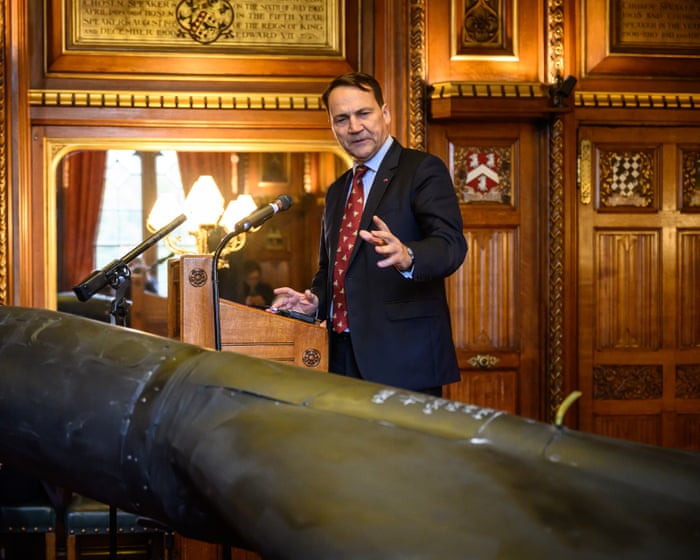Poland’s foreign minister has described Russia’s escalation of the war in Ukraine as “tactically stupid and counterproductive,” stating that last month’s drone incursion into Poland appeared intentional. During a visit to London, Radosław Sikorski noted that Vladimir Putin’s only achievement from the incident was to strengthen Western opposition. He also dismissed Russian objections to supplying Ukraine with US Tomahawk cruise missiles as unnecessarily provocative.
In early September, Russia launched 21 drones in a seven-hour intrusion, prompting the closure of airports in eastern and central Poland. Sikorski argued that the evidence points to a deliberate act, explaining, “The drones were all launched from one location and were unarmed. If it were accidental spillover from an attack on Ukraine, you’d expect a mix of armed and unarmed drones, but all that entered Poland were unarmed.”
He identified the drones as Russian-made Gerbera decoys, launched from Russia in what seemed a coordinated effort with Belarus. Sikorski added that this was partly a test of Poland and NATO’s air defenses, compelling them to respond by deploying fighter jets and other defensive measures.
Sikorski made these remarks ahead of a NATO defense ministers’ meeting in Brussels, where discussions will focus on defending Europe’s eastern flank and providing drones to Ukraine. Following the incursion, NATO allies agreed to supply additional jets for air policing under the Eastern Sentry operation.
A leaked defense paper set for release on Thursday reveals that the European Commission will push for fully operational European drone defenses by the end of 2027, as part of the previously termed “drone wall” project.
The Polish incident was one of several Russian incursions into NATO airspace in September, with drones also spotted in the Baltic states, Romania, Norway, and possibly other Scandinavian areas. Sikorski emphasized that these actions remind us Putin believes he is “at war with us,” a mindset he traces back to the 2006 Alexander Litvinenko poisoning and Putin’s confrontational speech at the 2007 Munich Security Conference.
“He’s been at war with us, but we didn’t acknowledge it because it seemed too absurd and strange,” Sikorski said. He described the Polish incursion as part of a “spectrum of provocations,” including poisonings, sabotage, and arson attacks, such as incendiary devices at parcel facilities in Poland, Germany, and the UK.
Despite Putin’s “probing,” Sikorski asserted that these incursions and hybrid threats have been tactically unwise and counterproductive for Russia, only solidifying public support for a deterrence policy against Moscow.
Meanwhile, Donald Trump is expected to discuss supplying Ukraine with Tomahawk missiles, which have a range exceeding 1,000 miles, in a meeting with Volodymyr Zelenskyy at the White House. The Kremlin has expressed extreme concern over this issue. However, Sikorski downplayed fears of the conflict escalating, pointing out that similar warnings were raised with each new weapon delivery to Ukraine, and each time Russia had to adapt.Sikorski noted that Tomahawk missiles could target Russian oil refineries, which have recently been hit by Ukrainian drone strikes. He explained that Russia’s vast territory makes it impossible to protect all potential targets with anti-aircraft systems, and Ukraine has been successfully reducing Russia’s oil production capacity. “When you achieve success, you should reinforce it,” he added.
Sikorski also mentioned that Hungary’s Prime Minister Viktor Orbán has been “whispering into Trump’s ear that Russia always wins.” However, the Polish minister countered this by pointing out Russia’s historical defeats: in Crimea during the 19th century, in the Russo-Japanese War of 1904-1905, in World War I, against Poland in 1920, and more recently in Afghanistan.
“Only when Russia loses a war are there any reforms,” Sikorski stated. “If Russia lost this war, it would be good for Ukraine, good for Europe, and also good for Russia.”
During his routine visit to the UK, the Polish minister met with Foreign Secretary Yvette Cooper and Keir Starmer’s national security adviser, Jonathan Powell. He also visited Parliament, where he participated in unveiling a decommissioned Shahed-136 drone.
The “drone wall” concept, proposed by the EU executive, involves a system for detecting, tracking, and neutralizing drones, as well as using drone technology for precision strikes against ground targets, according to a draft defense plan seen by the Guardian. However, EU sources indicated that the name “drone wall” will be dropped to gain broader support for the initiative. EU leaders are set to endorse the defense roadmap at a Brussels summit on October 23 as part of efforts to ensure Europe can defend itself from foreign invasion by 2030.
The idea originated in the Baltic states but has faced skepticism in Western Europe. French President Emmanuel Macron called for something “a little more sophisticated and complex.” In Germany, where the word “wall” carries negative historical connotations, senior politicians have expressed doubts about the concept while still supporting drone defense.
To secure wider geographical backing, EU officials argue that drone defenses could help protect borders and infrastructure, as well as combat organized crime.
Frequently Asked Questions
Of course Here is a list of FAQs about the Polish ministers statement regarding the Russian drone intrusion designed to be clear and helpful for a general audience
General Beginner Questions
1 What happened with the Russian drone and Poland
A Russian drone likely involved in the war in Ukraine crossed into Polish airspace This is a violation of Polands national borders and NATO airspace
2 Who is the Polish minister and what did they say
While not always named in initial reports it was likely the Defense or Foreign Minister They described the Russian drone intrusion as tactically foolish and counterproductive
3 What does tactically foolish mean in this context
It means the action was a stupid military move It didnt provide Russia with any significant tactical advantage but it did risk a major escalation with NATO
4 And what does counterproductive mean here
It means the action hurt Russias own goals Instead of weakening resolve it strengthened the unity of NATO and Polands allies likely leading to even more support for Ukraine and a stronger defensive posture on NATOs eastern flank
Deeper Analysis Implications
5 Why is this such a big deal
Poland is a member of NATO An attack on one NATO member is considered an attack on all While this was a single drone it tests this fundamental principle and brings the war dangerously close to a direct conflict between Russia and NATO
6 Was this an accident or an intentional provocation
Officials are investigating It could have been a navigational error by Russian operators or it could have been a deliberate test of NATOs air defenses and response protocols The ministers statement suggests they believe it was a reckless blunder regardless of intent
7 What has been NATOs response
NATO officials are monitoring the situation closely and are in close contact with Polish authorities The alliance has reiterated its commitment to collective defense and it will likely lead to a review of air defense measures along the border
8 How does this event benefit Ukraine
It serves as a powerful reminder to all NATO members that the threat from Russia is real and immediate This can help Ukraine by solidifying Western political and military support making arguments for aid more compelling
Common Problems Practical Concerns
9 Could this happen again
Unfortunately yes As long as



